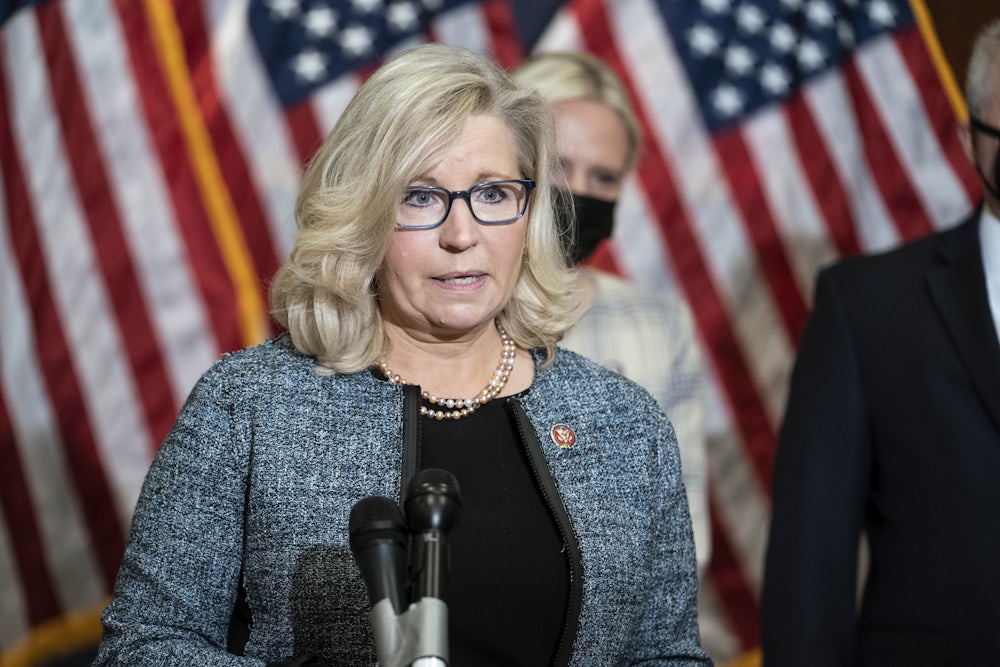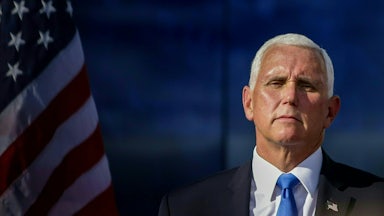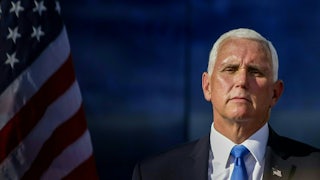There are those who believe the Republican Party lacks a cohesive vision for this country, that it has been drained of any ideas for governance, and that it lacks a policy agenda to contrast with the Democrats’ social and economic plans. That is simply not true. The GOP’s vision for American life is that Democrats stole the 2020 election from Donald Trump. The party’s central idea for national governance is that Donald Trump should be in charge of it. And its policy agenda is, well, doing things that could make it easier for Trump to win in 2024.
Not every single Republican is on board with this agenda. There are heretics like Wyoming Representative Liz Cheney, who dared to suggest that Trump’s incitement of a riot at the Capitol in January was bad. There are pariahs like Utah Senator Mitt Romney, who voted to convict the former president in two impeachment trials for abusing power. And there is a party that can’t quite yet bring itself to cast out Cheney and Romney.
After January 6, some commentators spoke of a “civil war” within the Republican Party and the wider conservative movement between the pro-Trump and anti-Trump factions. To the extent that such a “war” took place, the Trump loyalists won it almost immediately. The “Big Lie”—that Biden’s victory in 2020 was fraudulent or illegitimate—is all but canonical now on the American right. And the few stragglers who openly challenge it face half-hearted purges from public life.
Consider the plight of Romney. The GOP’s former standard-bearer narrowly won a censure vote at the Utah Republican Party’s annual convention in recent days. Some of the convention delegates sought to formally rebuke Romney for his votes against Trump and his criticism of the former president’s actions. “Mitt Romney’s votes to impeach President Trump and remove him from office in two ‘illegitimate’ impeachment trials hurt our party, hurt our Constitution, hurt our republic, and hurt our party,” Don Guymon, a Utah GOP delegate who sponsored the censure resolution, told a local news outlet. How Romney’s vote hurt either the Constitution or the republic is never quite explained.
During his appearance at the convention, Romney was made to face down hecklers. “I have a few folks who don’t like me terribly much, and I’m sorry about that,” he told the delegates at one point. “But I express my mind as I believe is right, and I follow my conscience as I believe is right.” According to The Washington Post, he told booing delegates that he was “a Republican all my life,” citing his father’s tenure as governor of Michigan, as well as his own long political career, which included the 2012 Republican presidential nomination. Romney’s fealty to his party was only barely returned by state delegates.
Cheney, who currently serves as the House GOP’s third-ranking member, is in slightly hotter water. She famously broke ranks with all but nine other members of her caucus to vote for Trump’s impeachment in January and denounced his incitement of the riot by saying there had “never been a greater betrayal by a president of the United States of his office and his oath to the Constitution.” Cheney and Trump weren’t exactly chummy before January 6, either. “We’ve got to get rid of the weak congresspeople, the ones that aren’t any good, the Liz Cheneys of the world,” Trump told supporters in his infamous January 6 speech before the riot.
None of what Cheney said about Trump’s responsibility for January 6 is wrong. But her continued criticism of Trump is highly inconvenient for a party that wants to pretend that the insurrection didn’t happen and largely supports Trump’s return to power on the false grounds that the 2020 election was stolen from him. The Wyoming Republican Party voted to censure Cheney for her role in Trump’s impeachment proceedings in January. She also faced what amounted to a vote of no confidence in her House leadership role, which she won in February.
But that internal support within the House GOP may now be flagging as she continues to highlight Trump’s role in the attack and calls for scrutiny into how it unfolded. “If a prerequisite for leading our conference is continuing to lie to our voters, then Liz is not the best fit,” Ohio Representative Anthony Gonzalez, a Republican who also voted to impeach Trump earlier this year, told The Hill. “Liz isn’t going to lie to people. Liz is going to say what she believes. She’s going to stand on principle. And if that’s going to be distracting for folks, she’s not the best fit. I wish that weren’t the case.”
That Romney and Cheney find themselves ostracized within their own party only highlights how the GOP can’t escape the gravity well of Trump’s misinformation campaign against American democracy. A CNN poll released last Friday found that roughly one-third of Americans, and 70 percent of all Republicans, think President Joe Biden was not the legitimate winner of the 2020 presidential election. There is no evidence to support that position, of course, but that hasn’t stopped former President Donald Trump and most other Republican officials from either spreading lies about Trump’s defeat or refusing to tell the truth about what happened.
If the United States had a slightly different political system, Cheney, Romney, and other apostates from the Trumpian faith could form a new political party that better represents their values. Alas, forming a viable third party is all but impossible in national politics thanks to the first-past-the-post electoral system and the immense infrastructure of the existing parties. It’s one reason why the occasional suggestions that Trump might break away from the GOP and form a “MAGA Party” of his own are so unlikely. That, and his grip on the Republican Party is so strong that there would be no point.
On Monday morning, Liz Cheney reasserted herself, tweeting, “The 2020 presidential election was not stolen. Anyone who claims it was is spreading THE BIG LIE, turning their back on the rule of law, and poisoning our democratic system.” About an hour later, Cheney ally and “Never Trump” Republican Bill Kristol offered support: “Whoa. @Liz_Cheney throws down the gauntlet.” It is a fairly incredible characterization of the moment: To simply assert the facts of the 2020 election, Cheney is doing something dramatic and provocative. But it’s also rather extraordinary for Cheney’s actions here to be characterized with “throw down the gauntlet”—the phrase that’s traditionally associated with issuing a formal challenge to a rival. What neither Kristol nor Cheney seems to understand is that their challenge to the purveyors of “the Big Lie” is over, and they lost.








